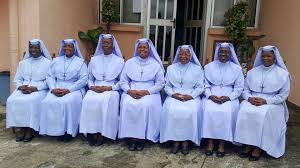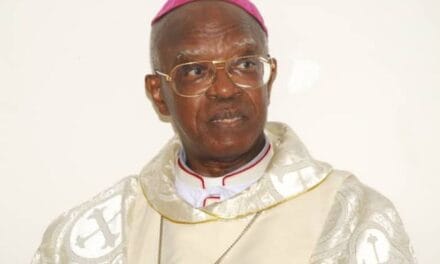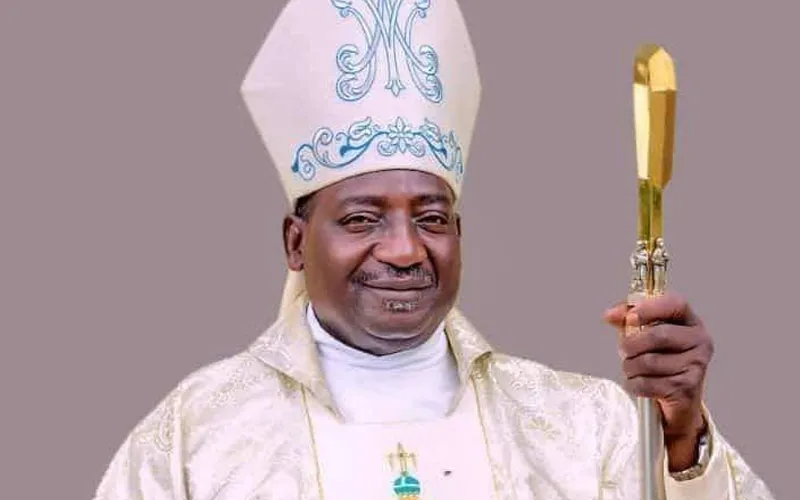 FROM THE COMMUNICATIONS OIFFICE OF RECOWACERAO
FROM THE COMMUNICATIONS OIFFICE OF RECOWACERAOIl a été noté que la lutte courageuse menée par les religieuses contre les trafiquants d’êtres humains au Nigéria a été un moment fort de la conférence en cours qui a réuni des religieux et religieuses dans ce pays d’Afrique de l’Ouest.
Il y a eu de plus en plus de cas de traite des êtres humains et d’esclavage sexuel au Nigéria, alors que le tollé général signalait que les interventions gouvernementales ne produisaient pas grand-chose. Des rapports récents indiquent que, sur plus de 20 000 Nigérianes qui se sont rendues en Italie au cours des trois dernières années, 80% d’entre elles ont fini par être victimes de la traite des êtres humains.
Cependant, en s’adressant aux supérieurs majeurs de différents ordres religieux réunis à l’Institut catholique de l’Afrique de l’Ouest (CIWA) à Port Harcourt pour une conférence conjointe d’une semaine, Sœur Teresa Okure de la Société du Saint Enfant Jésus (SHCJ) a souligné les gains que les hommes et les femmes religieux ont fait dans la lutte contre la traite des êtres humains et d’autres maux sociaux dans le pays le plus peuplé d’Afrique.
Lors de la conférence, Sr. Okure, professeur d’écriture et d’herméneutique de genre à la CIWA, s’exprimait au nom de l’Africa Faith and Justice Network (AFJN), une organisation de plaidoyer mondiale qui met l’accent sur les questions des droits de l’homme et de l’injustice sociale dans le contexte de la foi catholique. L’AFJN, basée à Washington, est présente au Nigeria sous le nom de Africa Faith and Justice Network, Nigeria (AFJN-N).
«L’équipe de l’AFJN m’a demandé de vous exprimer leur profonde gratitude, en particulier les Supérieures Majeures des Congrégations Religieuses, pour avoir envoyé vos sœurs participer à des ateliers et des activités de plaidoyer, en particulier à Abuja, dans l’État d’Edo et dans l’État d’Enugu», a déclaré Sr. Okure dans ses remarques d’ouverture à la conférence qui a débuté le lundi 13 janvier.
Elle a ajouté en référence aux ordres religieux des femmes dans son pays, « Leurs activités de plaidoyer ont ouvert les yeux à beaucoup et produit des résultats concrets qui ont conduit et conduisent encore à des changements dans les structures de l’injustice dans ces États. »
La sœur religieuse a souligné le rôle des hommes et des femmes religieux dans différentes congrégations du Nigéria qui avaient rejoint le groupe de défense qui, selon elle, travaillait à lutter contre toutes les formes de maux sociaux au Nigéria, en particulier la violence contre les femmes et les enfants, l’esclavage contemporain et les abus contre femmes, enfants et personnes vulnérables.
Dans l’État d’Edo, qui a été baptisé le plus grand site de la peste, Sr. Okure a déclaré que les activités des religieux avaient «conduit à la fermeture d’un bordel utilisé pour trafiquer les jeunes filles, à la création d’un groupe de travail anti-traite dans l’État et a également énormément contribué à l’introduction et à l’adoption d’une loi anti-traite dans l’État. »
Le groupe a rencontré d’autres groupes de défense au Nigeria pour s’attaquer aux causes profondes de la traite des êtres humains dans le pays. Des familles des victimes des sévices étaient présentes aux réunions.
«La plupart des gens l’ont blâmé (traite des êtres humains) sur la mauvaise gouvernance, le chômage et la mauvaise parentalité», lit en partie un bulletin d’information qui a été lancé au début de la conférence. Le bulletin détaille le travail de l’AFJN-N dans les États d’Edo et d’Enugu au Nigéria où la traite des êtres humains sévit.
«On pouvait voir la colère sur leurs visages. Certains ont accusé le gouvernement et déclaré qu’il connaissait les auteurs de la traite des êtres humains et (qu’il) faisait peu ou rien pour les traduire en justice », a indiqué le bulletin d’information.
En outre, les sœurs étaient à l’origine de la convocation de fabricants de «juju» par l’Oba du Bénin à qui on a demandé de renoncer à utiliser leur métier pour intimider les jeunes filles emmenées à l’étranger par des trafiquants. L’augmentation du nombre de cas de traite des êtres humains est principalement imputée à la sorcellerie.
Dans l’État d’Enugu, Sr. Okure a noté que les religieuses travaillaient en collaboration avec l’Organisation catholique des femmes, la Young Women Catholic Association et les membres de l’Agence nationale pour l’interdiction de la traite des personnes (NAPTIP) pour résoudre les problèmes de vente de bébés et de abus sur mineur.
«En général, les sœurs continuent de commettre l’injustice systémique dans notre pays. Ils travaillent à démanteler les structures d’injustice qui privent les enfants de Dieu de leur dignité », a déclaré la religieuse nigériane.
Sr. Okure, présidente fondatrice de l’Association catholique biblique du Nigéria (CABAN), a cependant noté que l’AFJC avait encore beaucoup à faire dans les différents pays africains.
«Cette Conférence continentale des religieux et religieuses d’Afrique est comme un géant dans un sommeil profond. On ne peut qu’imaginer ce que ferait cette Conférence si elle se réveillait pour travailler en collaboration pour repositionner l’Afrique en la fondant sur Jésus, dont la mission, l’Évangile seul a le pouvoir d’élever et de soutenir notre continent bien-aimé dans les voies de la justice, de l’amour et la paix », a souligné la religieuse.
Elle a ajouté: «Mon appel personnel est que cette Conférence conjointe entreprendra avec joie des projets communs viables et s’appuiera sur la puissance libératrice de l’Évangile pour y arriver.»
xxxxxxxxxxxx
It has been noted that the brave fight mounted by religious sisters against human traffickers in Nigeria has been a key highlight of the ongoing conference that has brought together religious men and women in the west African country.
There have been increasing cases of human trafficking and sexual slavery in Nigeria amid reported public outcry that government interventions are not yielding much. Recent reports indicate that, of the over 20,000 Nigerian women who went to Italy in the last three years, 80 per cent of them ended up as victims of human trafficking.
However, addressing major superiors of different religious orders gathered at the Catholic Institute of West Africa (CIWA) in Port Harcourt for a week-long joint conference, Sr. Teresa Okure of the Society of the Holy Child Jesus (SHCJ) pointed out gains that religious men and women have made in the fight against human trafficking and other social evils in Africa’s most populous country.
At the conference, Sr. Okure, a professor of Scripture and gender hermeneutics at CIWA, was speaking on behalf of the Africa Faith and Justice Network (AFJN), a global advocacy organization that stresses issues of human rights and social injustice in the context of the Catholic faith. AFJN, which is based in Washington has an active presence in Nigeria under the name Africa Faith and Justice Network, Nigeria (AFJN-N).
“The AFJN team has asked me to express their deep gratitude to you the Major Superiors of Women Religious Congregations in particular, for sending your Sisters to participate in workshops and advocacy events, particularly in Abuja, Edo State and Enugu State,” said Sr. Okure in her opening remarks at the conference that kicked off Monday, January 13.
She added in reference to the religious orders of women in her country, “Their advocacy activities have opened the eyes of many and produced concrete results that have led and are still leading to changes in the structures of injustice in these States.”
The religious sister highlighted the role of religious men and women in different congregations all over Nigeria who had joined the advocacy group that she said was working to combat all forms of social ills in Nigeria, particularly violence against women and children, contemporary slavery and abuse against women, children and vulnerable persons.
In Edo State, which has been christened the biggest site of the plague, Sr. Okure said activities of the religious had “led to the closure of a brothel used to traffic young girls, setting up of anti-trafficking task force in the State and also contributed immensely in the introduction and passing of anti-trafficking law in the State.”
The group has met with other advocacy groups in Nigeria to address the root causes of human trafficking in the country. Families of victims of the abuse were present at the meetings.
“Most of the people blamed it (human trafficking) on bad governance, unemployment and poor parenting,” reads in part a newsletter that was launched at the start of the conference. The newsletter details the work of AFJN-N in Edo and Enugu States of Nigeria where human trafficking is rife.
“One could see the anger on their faces. Some accused the government and said that it knows the perpetrators of human trafficking and (is) doing little or nothing to bring them to justice,” the newsletter has documented.
Additionally, the sisters were behind the summoning of “juju” makers by the Oba of Benin who were asked to desist from using their trade to intimidate young girls taken overseas by traffickers. Increase in cases of human trafficking has majorly been blamed on witchcraft.
In Enugu State, Sr. Okure noted that the women religious were working with collaboration with the Catholic Women Organisation, the Young Women Catholic Association and members of the National Agency for the Prohibition of Trafficking in Persons (NAPTIP) to address issues of selling babies and child abuse.
“In general, the Sisters continue to engage the systemic injustice in our country. They work to dismantle the structures of injustice that deprive God’s children of their dignity,” the Nigerian nun said.
Sr. Okure, the founding president of the Catholic Biblical Association of Nigeria (CABAN), however, noted that a lot was yet to be achieved by AFJC in the different African countries.
“This continental Conference of Men and Women Religious in Africa is like a giant in deep sleep. One can only imagine what this Conference would do if it wakes up to work collaboratively to reposition Africa by grounding it in Jesus, whose mission, the gospel alone has the power to lift up and sustain our beloved continent in the ways of justice, love and peace,” the religious Sister pointed out.
She added, “My personal appeal is that this Joint Conference would joyfully undertake viable common projects and rely on the liberating power of the gospel to make this happen.”
She commended the religious in Kenya for establishing a learning institution, which was set to become a full-fledged university.
“The men and women religious in Kenya, for instance, have established and operated Tangaza College, now heading to become a university. Many Nigerian Sisters and men religious have studied and are studying there, often with scholarships,” she said.
She added, “This joint Conference in Nigeria has far greater resources than that in Kenya. I pray that as a Joint Conference you may have the desire, will and zeal to evolve and operate sustainable common projects in service to the gospel.”
“The great success of the collaborative efforts of the Sisters in AFJN-N in a very short time is but a drop in the ocean to what this Conference can achieve together if it puts its mind to it,” Sr. Okure told the major superiors of different religious orders in Nigeria
- CATHOLIC ARCHBISHOP IN GHANA HAILS POPE LEO XIV AS GOD’S GIFT - 23 mai 2025
- POPE LEO XIV TO APPROVE CANONIZATIONS - 22 mai 2025
- THE EVOLUTION OF PAPAL TRANSPORTATION - 20 mai 2025






